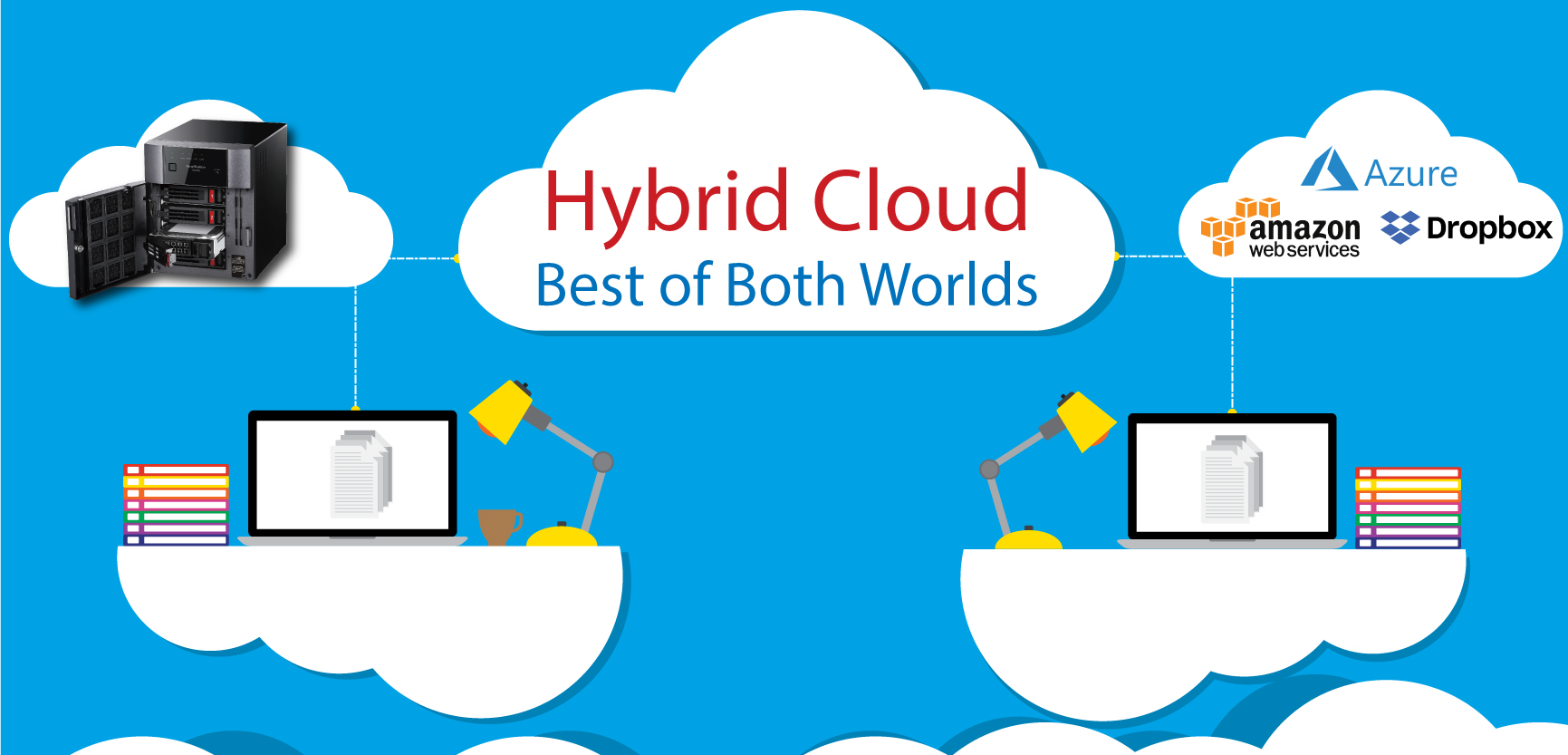What Is a Hybrid Cloud and How Can It Help Me Lower Cloud Costs?

For most businesses, cloud storage often comes in two flavors: public cloud—cloud services offered by third-party cloud providers over the Internet (Dropbox, Amazon S3, Azure, etc.), with cloud storage pricing structures based on storage or bandwidth; and private cloud—cloud data storage created from servers and other devices that reside solely within a single network or organization.
There are advantages and disadvantages to both, namely public cloud's ease of scalability but lack of control over security, and private cloud's flexibility but potentially higher costs. However, many businesses are opting to combine public and private clouds together into what is known as a hybrid cloud, often by integrating cloud services such as Dropbox and Azure with existing on-premises NAS (Network Attached Storage) devices, in order to fully reap the benefits of both. The hybrid cloud model reaps the full benefits of cloud computing by giving you greater control over customization and scalability, and is a "best of both worlds" solution to provide cost-effective data storage and backup while maximizing security
A hybrid cloud integrates third-party cloud services with your existing NAS (Network Attached Storage) environment, with you choosing the balance between the two to help you optimize costs, security, and capacity. The hybrid cloud model reaps the full benefits of cloud computing by giving you greater control over customization and scalability, and is a "best of both worlds" solution to provide cost-effective data storage and backup while maximizing security. You can enjoy the security of a private cloud server while performing cloud backups of non-essential data to a public cloud.
Benefits of Hybrid Cloud
A hybrid cloud model allows businesses to fully leverage the advantages of both public and private clouds while enjoying the flexibility to optimize costs, security, and capacity between the two.
The benefits of Hybrid cloud include:
• Cost Savings: A public cloud service will often charge you lots of vendor fees, including data operations fees and egress fees for when you move data off the cloud. With a hybrid cloud, there is less hardware required for data storage, saving you both space and power costs associated with arrays of local servers. A hybrid cloud model also allows you to extend, reduce, or redistribute resources as needed, and a streamlined network means faster speeds for backups and disaster recovery, saving costs through both increased efficiency and scaling back on unnecessary expenses. For example, hybrid can offer streamlined workload migration between public cloud and local servers, lowering migration costs.
• Availability to Meet Sudden Demands: Having a hybrid cloud allows you to quickly shuffle or increase resources to meet sudden data storage and access needs on the fly. For example, businesses that expect seasonal data spikes won’t have to scramble for resources. Having public cloud at the ready to handle sudden traffic burdens can keep your business going in any scenario.
• Streamlined Operations for Efficiency: Data and applications stored in local servers may be difficult to access from remote locations, constraining productivity. However, by integrating common cloud services such as Dropbox and Azure, data and applications can be made accessible from anywhere in the world by your team members, enabling smoother remote work and online backups. The flexibility of the environment can also possibly reduce latency and simplify the data transfer process between team members. A hybrid cloud approach gives you the flexibility of distributing your data requirements to the public cloud, private cloud, or local resources as needed so you can maximize efficiency.
• Enhanced Data Security: With a hybrid cloud approach, you can keep non-essential workloads and data in the cloud storing sensitive or essential business data in your local NAS for an extra layer of security. The TeraStation has robust built-in security features, and by following data security precautions such as strong passwords and enabling access security, you can ensure that your sensitive data stays safe. In addition, integrating public cloud grants you additional backup options to protect you against cyberthreats. Having an on-premises data storage and backup solution, especially an air-gapped location, is the only way to protect your data against online threats such as ransomware.
• Meeting Industry Compliance: Organizations in certain industries are subject to strict data privacy security regulations, such as the Health Insurance Portability and Accountability Act (HIPAA) and the Payment Card Industry Data Security Standard (PCI DSS) for the medical and finance sectors. Many countries and regions have also passed their own data privacy laws such as the General Data Protection Regulation (GDPR) from the European Union that dictate private data storage policies. Often, these regulations cannot be met with public cloud storage alone. With hybrid cloud, a business can securely store sensitive customer data on private clouds from local NAS and meet full compliance.
• Increased Scalability: With more granulated control over your hardware and storage, you can enable faster and more targeted capacity expansion without needing advanced or complicated planning. Public cloud makes it easy to add more storage, so there is no need to wait for new hardware to be purchased, set up, and integrated—simply expand your cloud storage as you see fit to meet your needs.
Leveraging the Best of Both Worlds with Buffalo NAS
Hybrid cloud models are powerful because you gain greater control over your data storage and hardware, and is a "best of both worlds" solution to provide cost-effective data storage and backup while maximizing security, flexibility, and scalability.
Our different TeraStation NAS solutions are ideally positioned to help you take advantage of both public and private cloud benefits. In addition to flexible and proven product offerings, Buffalo’s expert technicians are on hand 24/7 in North America to help advise you on the right hybrid cloud backup strategy—one that effectively protects your information and makes good business sense.



